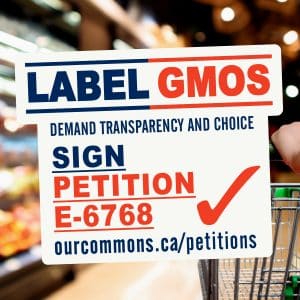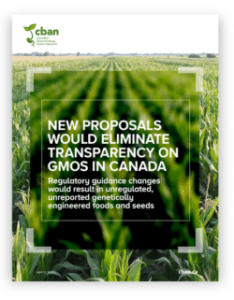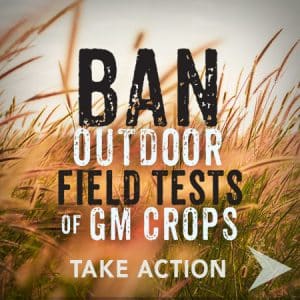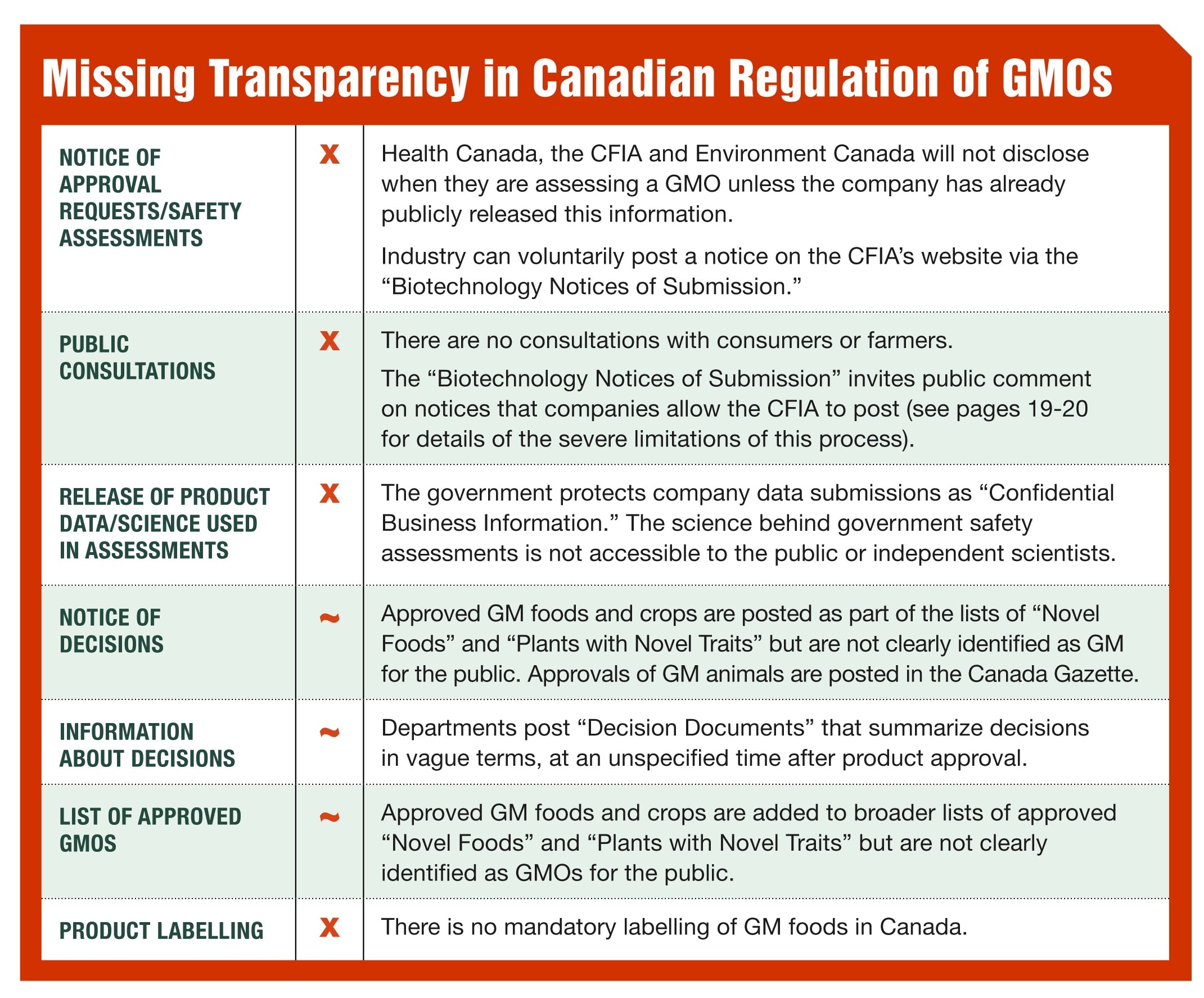Regulation and Policy
Genetically engineered (also called genetically modified or GM) crops were first approved in Canada in 1995, without public debate and little public notification. There is no mandatory labelling of GM foods in Canada and there is no consultation with the consumers or farmers before new GM foods and seeds are approved.
Health Canada does not do its own testing of GM foods but relies on information submitted by the companies that want new products approved. All of this information is classified as confidential business information and is not available to the public. The federal government does not conduct any assessment of the possible economic or social impacts.
The Canadian government does not specifically regulate genetic engineering but regulates biotechnology products under a broader category it calls “novel foods” and “plants with novel traits” which includes products of genetic engineering as well as organisms produced by other technologies including traditional breeding. The federal government now exempts many new gene-edited plants and foods from these regulations.
Take Action
 Click here to sign the House of Commons e-petition for mandatory labelling today. Deadline November 2, 2025. Please sign and share.
Click here to sign the House of Commons e-petition for mandatory labelling today. Deadline November 2, 2025. Please sign and share.
The e-petition 6768 was launched on the House of Commons website by the 15-group network the Canadian Biotechnology Action Network in partnership with Kids Right to Know, and authorized by Yves Perron, Member of Parliament for Berthier—Maskinongé and the Bloc Quebecois agriculture critic.
There is no mandatory labeling of genetically engineered (genetically modified or GM) foods in Canada despite intensive public campaigning and 20 years of polling that consistently show 75-95% of Canadians want these labels.
- September 5, 2025 – Press Release: Petition Demands Mandatory Labelling of Genetically Engineered Foods
 Health Canada and the Canadian Food Inspection Agency are now exempting some genetically engineered plants and foods from government pre-market safety regulation, specifically many of those produced through the new genetic engineering techniques of gene editing. This means that some genetically modified organisms (GMOs) can now enter into our food system without any government safety assessments, and without any notification to the federal government. Take Action at cban.ca/NoExemptions
Health Canada and the Canadian Food Inspection Agency are now exempting some genetically engineered plants and foods from government pre-market safety regulation, specifically many of those produced through the new genetic engineering techniques of gene editing. This means that some genetically modified organisms (GMOs) can now enter into our food system without any government safety assessments, and without any notification to the federal government. Take Action at cban.ca/NoExemptions
Updates
December 2, 2024: A US judge has overturned US regulatory exemptions for some GMOs, forcing the US Department of Agriculture to revert to 2020 regulations. Click here to read the press release from the plaintiffs.
February 2024: Similar to the French ANSES, the German Federal Agency for Nature Conservation (BfN) argues against exempting new genetic techniques (NGTs) from regulation. In its policy brief it argues that “the approach of considered equivalence lacks a valid scientific basis and violates the precautionary principle, since plausible risks cannot be excluded.” Click here to read the briefing.
February 5, 2024: The South African Minister of Agriculture has taken a decision to uphold reject arguments from the biotechnology industry and ensure government risk assessments for all gene edited GMOs. Read the reaction to the South African decision to uphold regulation here.
CBAN Press Release, September 27, 2023: Newly released e-mails show extent of industry influence over Health Canada decision to gut regulatory oversight of GM foods
- Radio-Canada report, September 26, 2023: “Tiger Team”: When civil servants and lobbyists cooperate in the shadows
CBAN Opinion article in The Hill Times – September 2023: New regulatory guidance sets up corporate self-regulation of GMOs
CBAN Briefing to Members of Parliament – May 2023: Reverse New GMO Regulatory Guidance, to Ensure Safety and Transparency
Press Release – May 3, 2023: Federal government allows biotechnology companies free reign in the food system, removes safety checks on corporate science and denies transparency to farmers and food companies
March, 2023: Gene editing for sustainable agriculture? CBAN’s comments on the proposed federal government Sustainable Agriculture Strategy.
May 18, 2022 – Press Release: Federal government abandons safety assessments and transparency for new gene-edited foods
 CBAN Report: New Proposals Would Eliminate Transparency on GMOs in Canada: Regulatory guidance changes would result in unregulated, unreported genetically engineered foods and seeds, April 13, 2022.
CBAN Report: New Proposals Would Eliminate Transparency on GMOs in Canada: Regulatory guidance changes would result in unregulated, unreported genetically engineered foods and seeds, April 13, 2022.
June 10, 2021: On June 1, the company Bioceres announced Canadian approval of is new genetically engineered soy however the product was not listed as approved by Health Canada and the Canadian Food Inspection Agency (CFIA) on government websites. CBAN confirmed the product is approved. However, Health Canada & CFIA are notifying companies about approvals before the public. Canadians should find out about public decisions from government, not private companies. Read CBAN’s letter to Health Canada and the CFIA asking for consistent, accessible, and timely information for the public.
Europe – 2020: The RAGES project (Risk Assessment of Genetically Engineered Organisms in the EU and Switzerland) was carried out between 2016 and 2019 to critically evaluate risk assessment of genetically engineered food plants as performed by the European Food Safety Authority (EFSA) and its Swiss counterpart: The EU Parliament has in recent years adopted around 40 resolutions against further approvals for the import of genetically engineered plants. One of the main criticisms was a lack of adequate and sufficient risk assessment. Experts from several member states raised similar criticisms. Nevertheless, the EU Commission gave the green light to all these imports. The results of the international research project RAGES now show that the concerns of EU Parliament are fully justified: There is a substantial contradiction between the legally required safety standards and the reality of the EU approval process. “Risk assessors are following a reductionistic, restrictive evidential approach, which largely ignores the complexity of life forms and their interactions with their environments as well as evolutionary principles.”
Regulating Genome Editing
There is an international fight over the regulation of genetically engineered (genetically modified or GM) foods, plants and animals. New genetic engineering techniques called genome editing, or gene editing, have opened up new negotiations over national regulation, leading some countries to exempt certain genome edited products from government oversight.
In 2022-2024, Health Canada and the Canadian Food Inspection Agency changed guidance on the risk assessment of “novel” foods and plants, removing pre-market regulation from some products of genetic engineering, particularly some products of the new gene editing techniques. Federal government agencies have concluded that products with no foreign DNA do not meet the regulatory definition of “novel” and do not therefore need to be subject to government safety assessments and any requirements for transparency. Read more on our campaign webpage.
Ban Outdoor Field Testing of GM Crops
On June 14, 2018, the Canadian government announced a contamination incident with unapproved genetically modified (GM, also called genetically engineered) wheat. Several GM wheat plants were found on a road in Alberta in an isolated contamination case and the government does not know how they got there. No GM wheat was ever approved for growing or eating in Canada, but the GM trait found growing in Alberta was field tested from 1998-2000.
 The National Farmers Union is calling for a ban on outdoor testing of GM crops. “The only way to prevent these incidents happening in the future is to ban outdoor testing.” – Terry Boehm, Chair of the National Farmers’ Union Seed Committee
The National Farmers Union is calling for a ban on outdoor testing of GM crops. “The only way to prevent these incidents happening in the future is to ban outdoor testing.” – Terry Boehm, Chair of the National Farmers’ Union Seed Committee
CBAN wrote to the Canadian Food Inspection Agency supporting the call for a ban on field testing and for the disclosure of all previous and current field test locations, and for a change in regulation to require an assessment of potential economic harm before GM crops are released.
Click here to send your letter asking for a ban on field testing.
Low-Level Presence (LLP)
“Low Level Presence” (LLP) is the proposal to allow our food to be contaminated by a percent of genetically engineered foods that have not yet been approved for safe eating by Health Canada, but that have been approved for human consumption in at least one other country, in accordance with international (Codex) guidelines. Every country currently has “zero-tolerance” for contamination by GM foods that their regulators have not approved as safe but LLP would change this. Click here more details and resources on Low-Level Presence.
Royal Society of Canada’s Expert Panel
The Royal Society of Canada’s Expert Panel on the Future of Food Biotechnology released its highly critical report of Canadian regulation “Elements of Precaution: Recommendations for the Regulation of Food Biotechnology in Canada” in 2001. This report was produced on the request of the departments that regulate GE: Health Canada, the Canadian Food Inspection Agency and Environment Canada. Virtually none of the recommendations were implemented and the report’s recommendations are still highly relevant.
After initially dismissing the Royal Society of Canada’s Expert Panel recommendations, the government established an “Action Plan” to address them. But our analysis shows that the government only addressed 2 of the 58 recommendations: “Genetically Modified Organisms and precaution: Is the Canadian Government Implementing the Royal Society of Canada’s Recommendations?” by Peter Andrée and Lucy Sharratt, 2004. Read the Executive Summary or view the entire report.
People’s Food Policy Calls for GM Phase-Out
The People’s Food Policy Project (2008-2011) mobilized approximately 3,500 people across Canada in a grassroots initiative to develop a food sovereignty policy for Canada. This policy is published as “Resetting the Table: A People’s Food Policy for Canada” with the following recommendations about genetic engineering:
- Democratize science and technology policy and integrate the precautionary principle into all stages of decision-making.
- Genetically-Modified Organisms (GMOs) are living pollution that self-replicate. They cannot be recalled or controlled once they have been released and can spread and interbreed with other organisms, thereby contaminating ecosystems and affecting future generations in unforeseeable and uncontrollable ways. Genetically- Modified (GM) crops threaten agro-biodiversity which is fundamental to global food security, as well as threaten the future of organic food and farming through contamination. Existing GM crops should be phased out and there should be no further approvals of GM crops and animals. A just transition process, including financial and technical support, needs to be established to assist farmers to shift back to non-GM seed sources and to adopt ecological agriculture practices.
- The power over seeds, and potentially breeds, represented by monopoly control has become a mechanism for transferring wealth from farmers and rural communities into the hands of corporations and their shareholders. Canada’s patent legislation should be amended to explicitly disallow the patenting of life, including living organisms and genetic sequences.
- Protect and support the open and free sharing of non- transgenic seeds and breeds as a fundamental practice of agriculture.
- Establish a national ban on “terminator” technology and actively support the existing international ban at the United Nations Convention on Biological Diversity.
Science and Technology for Food and Agriculture
Challenges: Our food system is based on thousands of years of knowledge and innovation by indigenous peoples, farmers, fishers, and cooks. This rich and diverse knowledge is being marginalized as risky technologies facilitate greater concentration, industrialization and industry control in food and farming. Potential threats (often originally introduced as technological fixes for problems caused by previous technologies) range from the more widely-known platforms of synthetic chemicals and genetic engineering to the emerging applications of nanotechnology, synthetic biology, and climate engineering technologies. These are occurring in the context of a global land grab to feed biomass-intensive “green” technologies, and at the expense of food production and ecosystem health. The parallel erosion of biodiversity and community resilience severely undermines people’s capacity to strengthen local food systems, as well as respond to the increasing challenges posed by climate change.
Ways Forward: Decision-making processes regarding science and technology need to be democratized and guided by precaution and common interest if we are to strengthen our ability to feed ourselves, ensure sustainable livelihoods, and protect biodiversity and healthy ecosystems into the future. ‘Science’ should be acknowledged as including all forms of useful knowledge (codified and tacit) coming from diverse forms of learning and practice including indigenous and farmer knowledge and people’s everyday experience of food. By helping to strengthen and expand ecological agriculture, science and technology can play a particularly positive role in facing present and future challenges in food and agriculture.
Resources on Regulation in Canada
- CBAN’s GMO Inquiry report December 2015: Are GM Crops and Foods Well Regulated?
- Overview: Government use of terms: genetic modification and genetic engineering
- Click here to view various letters from government departments relating to regulation of GMOs, referred to in the report “Are GM Crops and Foods Well Regulated?”
- People’s Food Policy Calls for GM Phase-Out, June 2011 – Click here for a summary of what the People’s Food Policy says on genetic engineering.
- The Royal Society of Canada’s Expert Panel on the Future of Food Biotechnology released its highly critical report of Canadian regulation “Elements of Precaution: Recommendations for the Regulation of Food Biotechnology in Canada” in 2001. This report was produced on the request of the departments that regulate GE: Health Canada, the Canadian Food Inspection Agency and Environment Canada. Virtually none of the recommendations were implemented and the report’s recommendations are still highly relevant.
- After initially dismissing the Royal Society of Canada’s Expert Panel recommendations, the government established an “Action Plan” to address them. But our analysis shows that the government only addressed 2 of the 58 recommendations: “Genetically Modified Organisms and precaution: Is the Canadian Government Implementing the Royal Society of Canada’s Recommendations?” by Peter Andrée and Lucy Sharratt, 2004. Read the Executive Summary or view the entire report.
- The Real Board of Directors: The Construction of Biotechnology Policy in Canada 1980-2002 by Devlin Kuyek






